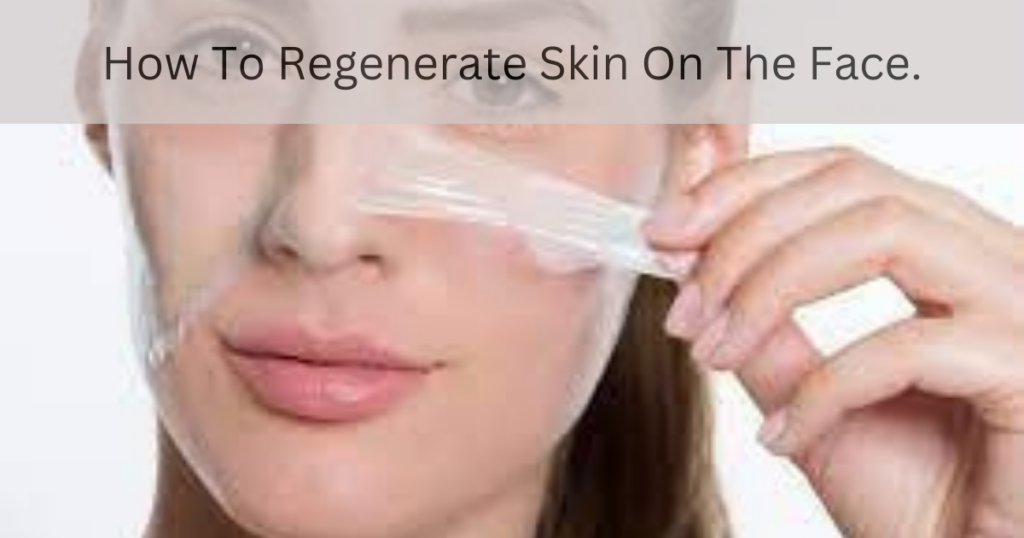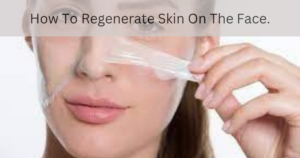If you’re wondering how to regenerate skin on the face and restore its natural radiance, you’ve come to the right place. Understanding the factors contributing to skin degeneration is crucial for implementing effective skincare practices and maintaining a youthful complexion. From environmental influences to lifestyle habits, various factors can accelerate the aging process and lead to skin degeneration. Here, we’ll explore the top 10 causes of skin degeneration on the face to help you make informed choices for healthier, more vibrant skin:
UV Exposure
Prolonged exposure to ultraviolet (UV) radiation from the sun or tanning beds is one of the primary culprits behind skin degeneration. UV rays penetrate the skin, causing damage to collagen and elastin fibers, leading to wrinkles, sagging, and age spots.
Free Radical Damage
Free radicals, unstable molecules produced by factors like UV exposure, pollution, and cigarette smoke, can damage skin cells and accelerate aging. This oxidative stress contributes to the breakdown of collagen and elastin, leading to loss of firmness and elasticity.
Poor Skincare Habits
Neglecting proper skincare practices, such as inadequate cleansing, lack of moisturization, and failure to use sunscreen, can impair the skin’s ability to regenerate and protect itself. Over time, this can lead to dullness, dehydration, and premature aging.
Smoking
Smoking not only damages your overall health but also accelerates skin aging. The chemicals in cigarette smoke constrict blood vessels, reducing blood flow to the skin and depriving it of oxygen and nutrients. This can lead to a dull complexion, wrinkles, and a loss of skin elasticity.
Unhealthy Diet
A diet high in processed foods, sugar, and unhealthy fats can contribute to inflammation in the body, which can manifest as skin issues such as acne, rosacea, and premature aging. Conversely, a diet rich in fruits, vegetables, and antioxidants can support skin health and regeneration.
Lack of Sleep
Inadequate sleep can disrupt the body’s natural repair processes, including those involved in skin regeneration. Chronic sleep deprivation can lead to dark circles, dull skin, and an overall tired appearance.
Chronic Stress
High levels of stress can trigger the release of cortisol, a hormone that can break down collagen and elastin fibers in the skin. This can lead to accelerated aging, increased sensitivity, and impaired skin barrier function.
Dehydration
Dehydrated skin lacks moisture and appears dry, dull, and prone to fine lines and wrinkles. Factors such as inadequate water intake, excessive caffeine or alcohol consumption, and harsh weather conditions can contribute to skin dehydration.
Genetics
Genetic factors play a significant role in determining how your skin ages and how susceptible it is to certain skin conditions. While you can’t change your genetics, understanding your predispositions can help you tailor your skincare routine to address specific concerns.
Environmental Pollution
Exposure to pollutants such as smog, smoke, and airborne toxins can damage the skin’s protective barrier and lead to inflammation and oxidative stress. Over time, this can contribute to premature aging and a dull, uneven complexion.
By understanding the factors that contribute to skin degeneration on the face, you can take proactive steps to protect and rejuvenate your skin.

How To Regenerate Skin On The Face. 10 Practical Tips
Regularly cleansing your face removes dirt, oil, and impurities that accumulate throughout the day or night. Use a gentle facial cleanser suited to your skin type, and massage it onto damp skin using circular motions. Rinse thoroughly with lukewarm water and pat dry.
Advantages:
- Prevents clogged pores and breakouts
- Enhances the effectiveness of skincare products
- Improves overall skin health and appearance
Regular Exfoliation
Exfoliation involves removing dead skin cells from the surface of your skin, revealing smoother, more radiant skin underneath. Choose a gentle exfoliating scrub or chemical exfoliant and use it 2-3 times a week, depending on your skin’s tolerance. Massage onto damp skin in gentle circular motions, then rinse off thoroughly.
Advantages:
- Improves skin texture and tone
- Stimulates cell turnover and regeneration
- Helps prevent acne and blackheads
Hydration
Keeping your skin well-hydrated is essential for maintaining its elasticity and promoting regeneration. Apply a hydrating moisturizer suited to your skin type twice daily, especially after cleansing and exfoliating. Look for ingredients like hyaluronic acid to lock in moisture.
Advantages:
- Prevents dryness and flakiness
- Enhances the skin’s natural barrier function
- Improves overall skin health and resilience
Sun Protection
Protecting your skin from the sun’s harmful UV rays is crucial for preventing premature aging and supporting skin regeneration. Apply a broad-spectrum sunscreen with SPF 30 or higher every morning, even on cloudy days. Reapply every 2 hours if you’re outdoors or sweating heavily.
Advantages:
- Reduces the risk of sunburn, wrinkles, and age spots
- Preserves collagen and elastin fibers
- Prevents skin cancer
Antioxidant-Rich Skincare Products
Antioxidants help neutralize free radicals that can damage skin cells and impede regeneration. Incorporate antioxidant-rich serums or creams into your skincare routine, focusing on ingredients like vitamin C, vitamin E, and green tea extract.
Advantages:
- Supports collagen production and repair
- Guards against environmental stressors
- Enhances skin’s natural defense mechanisms
Retinoids
Retinoids are derivatives of vitamin A that promote cell turnover and stimulate collagen production. Start with a low-concentration retinol product and gradually increase usage as tolerated. Apply a pea-sized amount to clean, dry skin at night, and always use sunscreen during the day.
Advantages:
- Reduces the appearance of fine lines and wrinkles
- Improves skin texture and tone
- Helps to unclog pores and prevent acne
Balanced Diet
A diet rich in vitamins, minerals, and antioxidants provides essential nutrients for skin health and regeneration. Incorporate plenty of fruits, vegetables, lean proteins, and healthy fats into your diet, and limit processed foods and sugary snacks.
Advantages:
- Supports overall skin health and vitality
- Reduces inflammation and promotes healing
- Enhances the effectiveness of skincare products
Adequate Sleep
Quality sleep allows your skin to repair and regenerate overnight, leading to a more radiant complexion. Aim for 7-9 hours of uninterrupted sleep each night, and establish a relaxing bedtime routine to promote better sleep quality.
Advantages:
- Reduces under-eye puffiness and dark circles
- Improves overall skin radiance and appearance
- Enhances mood and cognitive function
Stress Management
Chronic stress can negatively impact skin health and impede regeneration by increasing the production of cortisol. Practice stress-reducing activities such as yoga, meditation, deep breathing exercises, or engaging in hobbies you enjoy.
Advantages:
- Minimizes stress-related skin issues such as acne flare-ups
- Promotes relaxation and a sense of well-being
- Supports overall health and wellness
Professional Treatments
Professional skincare treatments can provide more intensive rejuvenation and regeneration. Consult with a dermatologist or skincare professional to discuss options such as chemical peels, microdermabrasion, or laser therapy.
Advantages:
- Offers targeted solutions for specific skin concerns
- Provides immediate and visible results
- Supervised by skincare experts for safety and efficacy
Conclusion
By incorporating these 10 tips into your skincare routine, you can effectively promote skin regeneration and achieve a healthier, more youthful complexion. Remember to be patient and consistent in your efforts, and consult with a dermatologist or skincare professional if you have specific concerns or questions. Here’s to healthier, happier skin!


